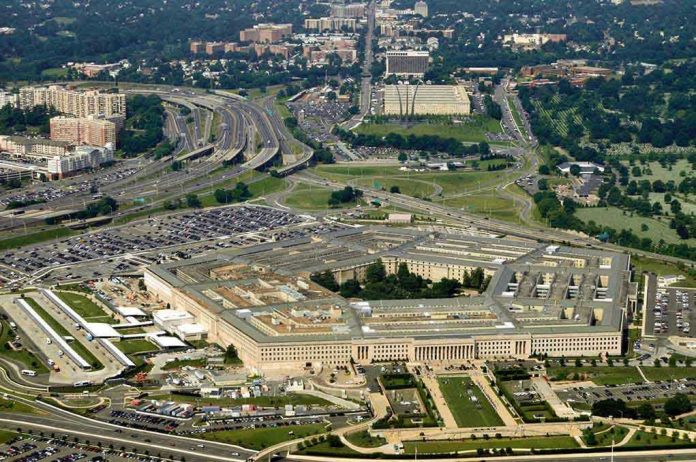
Twenty Medals of Honor still commemorate one of the darkest chapters in U.S. history, and now, Secretary Pete Hegseth’s refusal to rescind them has reignited a storm that refuses to die down.
Story Overview
- Hegseth’s controversial decision keeps Medals of Honor awarded for the Wounded Knee Massacre intact.
- Native American leaders and activists denounce the move as a fresh insult and a perpetuation of historical trauma.
- Congressional efforts to overturn the Army’s stance gain new momentum amid widespread protests.
- Military tradition, historical accountability, and Indigenous rights collide in a national reckoning over legacy and justice.
The Medals That Won’t Go Away: Power, Precedent, and Pain
Secretary of the Army Pete Hegseth’s announcement delivered a simple message: the Medals of Honor awarded to soldiers after the 1890 Wounded Knee Massacre would not be rescinded. For Native American communities, this decision was not just a bureaucratic matter—it was a visceral blow. The medals, given for actions during a massacre that killed hundreds of Lakota men, women, and children, have long been condemned by historians and Native leaders as a stain on American military valor.
Wounded Knee’s legacy is not just a historical footnote. For descendants of the victims and tribal communities, the medals symbolize a refusal to acknowledge the depth of government-sanctioned violence. Hegseth’s justification—honoring “the standards of the time” and concerns about “rewriting history”—struck many as hollow. Oglala Sioux leaders responded with outrage, calling the move a grave injustice and a continuation of disrespect for their ancestors. The immediate aftermath saw protests erupting on reservations and statements of condemnation from national Native organizations and members of Congress.
The Collision of Tradition and Accountability
The controversy over the medals is rooted in a broader struggle between military tradition and historical accountability. Since the 1990s, Native activists and some lawmakers have pushed for Congress to rescind the medals, arguing that they reward acts of atrocity rather than valor. Despite multiple bills and resolutions, the medals have remained, protected by a culture wary of retroactively altering the military’s highest honors. Veterans’ groups are divided—some support review and correction, while others warn against “presentism,” or judging the past by today’s standards.
Historians and military ethicists consistently describe the Wounded Knee medals as a historical injustice. Smithsonian Magazine and the National Museum of the American Indian supply detailed accounts of the massacre’s brutality and the disproportionate number of awards given compared to other battles. Military ethicists argue that maintaining the medals undermines the integrity of the Medal of Honor, which is supposed to recognize acts of valor, not participation in the slaughter of civilians.
Hegseth’s decision on Wounded Knee medals sparks outrage in Native American communities https://t.co/xloN6t9k7j
— The Oregonian (@Oregonian) October 1, 2025
Native Resistance and Congressional Showdown
Native American communities have responded with renewed activism, channeling outrage into legislative campaigns and public demonstrations. Tribal leaders and organizations, such as the National Congress of American Indians and the Native American Rights Fund, have called for Congress to override the Army’s decision. The Congressional Native American Caucus has launched fresh efforts to bring the issue back to hearings, hoping public pressure will force a change. The continued resistance is not just about the medals—it’s about the recognition of historical trauma and the quest for justice that remains unfulfilled.
Legislative momentum is building. Congressional hearings in August 2025 brought emotional testimony from Native survivors’ descendants and expert witnesses, while October saw new bill proposals aimed at forcing a review of controversial military honors. The outcome is uncertain, but the debate is shaping up to be a defining test of how America confronts its past. The stakes extend beyond symbolism; they touch on federal-tribal relations, the integrity of military institutions, and the nation’s willingness to reconcile with its history.
Historical Reckoning and the Battle Over Memory
The legacy of Wounded Knee and its medals is now a national flashpoint in the ongoing battle over historical memory. Museums, educators, and historians are joining the conversation, using the controversy to stimulate dialogue about justice, reconciliation, and the meaning of military honor. Some experts, like Dr. Philip Deloria of Harvard, argue that refusing to rescind the medals is a missed opportunity for reconciliation. Others caution against erasing history, warning that the past must be remembered, not revised.
As the debate rages, ordinary Americans are increasingly exposed to the complexities of historical reckoning and Indigenous rights. The controversy is influencing election cycles and legislative priorities, with candidates and lawmakers pressured to take a stand. The story’s open loop—will Congress step in, or will the medals endure as a permanent scar—continues to engage and divide the public. For Native communities, the fight is not just political; it is personal, cultural, and a testament to resilience in the face of enduring injustice.



